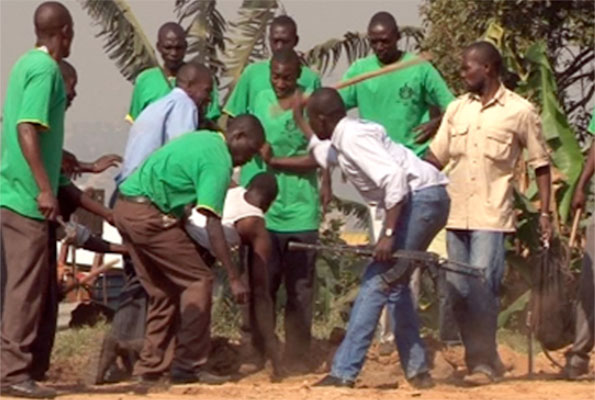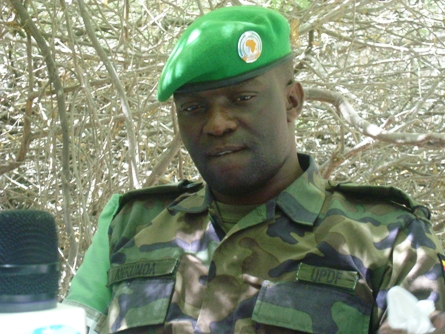lived in the Bugolobi flats, the Israeli-built originally officer homes, in Kampala of the early 80’s, you would have dwelt side by side with unexploded ordinance, grounded military personnel carriers (APC’s) and a market neighborhood referred to by residents as the “Middle East” (now Bugolobi market). The story goes that lower ranking officers from Mbuya military barracks envious of their officer mates living in the flats would clash in the mud and rust structures of the market after dark in fights over alcohol, women and just for the fan of socking it to the fellas who climb stairs to their beds. That is why the place was apparently named “Middle East” after the warring sides. In the bad years gunshots were a regular after dark and by dusk, as the soldiers would be returning to their homes. The flats are presently being gentrified of course. They are now the private property of residents when their owner, the National Housing and Construction Corporation offered them for sale. Gated communities are established here with manicured lawns and private security guards to watch over the expensive cars in the allotted parking spaces.”Good will”, a market charge for the opportunity to be a tenant runs into the tens of millions.
The market itself is one of the better-managed ones in Kampala- after a deal with old stall operators to have right of first buy – like the flats. The nearby community now has expanded. A popular restaurant right across the market is Bamboo Nest, which as journalists will tell you is nowadays a hangout too for security personnel from the nearby Military Headquarters and lately the head offices of the Chieftaincy of Military Intelligence. Next to Bamboois a Super Market and hospital. Banks, ATM’s, hotels and spas make this area much sought after for Kampala’s up worldly mobile classes.
There may be armed men about- but this is not Middle East of old.
Few of the old families still live here or but mainly in nearby Mutungo, Luzira and Port Bell. This part of Kampala is where most “northern” families lived and perhaps best illustrates their relationship to the military in previous regimes when political power in Uganda was dominated by northern tribes. In the nearby Our Mary of Africa Church– baptism rosters are full of northern names from the previous years of occupancy of the mansions around and the flats below.
Changes of government in Uganda and elsewhere in Africa come with the re-distribution of opportunities amongst co-ethnics, from the vanquished to the victorious. It is a touchy subject less alive in the language of public policy. In Uganda there are laws to restrain sectarian or tribal utterances or organizations particularly for political purposes. However Kampala’s various market riots and their elevation to some sort of social struggle by politicians, activists and pundits have at their base- well a tribal society. This often creates a politics of neighborhoods if not issues.
In the case of this area the exodus of its tribal elements to nearby neighborhoods including into Luzira-Portbell will no doubt feature in the days to come. Often hordes of private security guards – those who have northern and eastern roots still choose to live in these parts. Unlike say Kalerwe or Natete, adopted neighborhoods or what I heard recently referred to as ethnic territoriality has remained fairly consistent amongst Kampala’s many hills. This is so even if wealth creation and distribution amongst the lower classes has faced pressures from government policy or a lack thereof.
During the “Buganda riots” in 2009, it was clear that many people who participated in the actual rioting were not always ethnic Baganda. In the slums and ghettos to be a Muganda may have taken on a more class meaning than the rhetoric of Buganda nationalists on various radio stations at the time. Government response then was also directed at the seat of the Buganda government and its politics and focused less ( as I argued it should) on the urban poor as a constituency.
Indeed my own opinion still is that the language of the ghetto being Luganda, contributed to this feeling of affinity with the Kingdom at that time and may still bind the lower rungs of Kampala’s restless, slum dwelling, petty trading societies. The ghetto protested the establishment not because of its politics but its policies. Government handlers however may have been spooked quite rightly with some of the overtly tribal violence in which people with “western” features (seen as the privileged class of today from the President’s home area) were attacked and government vehicles burnt as a rejection of the “establishment”.
Where government policy has struggled in the city (provision of water, electricity, planned neighborhoods etc), the view that out of its incoherence is a more coherent if not deliberate redistribution of wealth amongst specific ethnic groups is a major challenge for policy makers. This is one of the first areas that I and my colleagues attempted to tackle at our Think Tank project- mainly because it is a major distraction (ETHNICITY AND ECONOMIC WELL-BEING IN UGANDA 2009 )if a convenient one for politics.
It is however a failure of sub-municipal, municipal and national politics that interest groups congregate not on the issues of interest but other identities.
Lately Kampala has been torn between an elected and populist Mayor Elias Lukwago and a state official Jennifer Musisi. Lukwago’s power base is ultimately the city’s poor (and Baganda both class and ethnic meanings emphasized). Now comes the killing of two residents of Port Bell at what was an eviction exercise by the Kampala Capital City Authority, which has been trying to establish its authority over the Kampala City Council-, long a heavily political body whose power base is the same as Mr. Lukwago’s. It would appear that the strength of clashes between “security forces” and “protestors” in Kampala often vary with the volume of ethnic residences in the city’s various settlements. Its virulence mapping into politics of the territory in question (so Kalerwe may be different from Kawempe as would Nakawa and Port Bell. One dead in Luzira has co-incidentally been identified asOnyango).
This fragmentation may well be what is keeping the city safe.
In other words no one “political” identity has won the day. However there is a danger that the frequency of these protests is slowly marketing the battle lines in the wider sense of the divide between the poor and the rich as well as the old and frightening prospect of how this will be ethnically interpreted. If the clashes become larger and an extended case of lawlessness, violence and chaos erupts and leads to some sort of political crisis- the ethnic bogey will complicate any discussion of accountability and policy. It also presents a challenge to both sides competing for power.
The Opposition movement would rather see itself as waging a legitimate class struggle but could be caught in the expediency of more evolved political identities. The government on the other may as its defense argue the importance of law and order only to have it complicated by the ethnicization of violence against it- thereby leading to a siege mentality amongst its elites. Either way an escalation may well come by way of ethnic politics entering the arena of policy contest currently underway- something that is best avoided.
On the face of it the slaying of the Luzira Two is simply a criminal act. The bodyguard of the deputy director of KCCA Mr. George Agaba who led the exercise opened fire on the crowd – in full view of the cameras rarely firing in the air to scare. However sadly, Mr. Agaba is becoming the center of the story (it may not matter that is guard is reportedly called Santos Komakech or Makmot, a Northerner). Who is he really is being questioned on social networking sites? Why did he have a plain-clothes guard armed with a pistol and an AK-47? Which agency was his guard working for? Who issued his weapons?
What is the logic behind the Luzira demolitions? Why Luzira and not the many other areas of obvious infringement of city building rules? Is this government doing development or is it extending the privileges of its elite? Such will be the complicated tapestry of the debate in these trying times. If the days of “Middle East” are to be avoided how should government policy negotiate the tribal quarters of Kampala’s ghettos and their appeal in the power struggles of the day?










